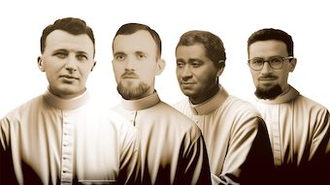Pope on importance of rediscovering wonder and gratitude

Four new Blesseds - St Francis Xavier Missionaries martyred in DR Congo in 1964.
Source: Vatican Media
In his reflection on Sunday's Gospel, after the Angelus with pilgrims in St Peter's Square, Pope Francis spoke of the importance of rediscovering a sense of wonder and gratitude.
After multiplying the loaves of bread, Jesus told the crowds, "I am the living bread that came down from heaven". The Gospel recounts how some argued over what Jesus meant by this and how He could offer His own flesh as nourishment, a question the Pope said we can also ask ourselves today, but with an attitude of wonder and gratitude.
The Pope said an openness to wonder is needed by all, and not of suspicion as recounted of those who argued about the matter in the Gospel. He noted how Jesus, in speaking of Himself as the "bread from heaven", is a gift that "exceeds all of our expectations," as His flesh and blood to which He refers are "the humanity of the Saviour, His very life offered as a nourishment for our own."
By appreciating how Jesus is offering His entire life, flesh and blood, for our salvation and everlasting spiritual nourishment, we can only be grateful, the Pope remarked, as "we recognize Jesus where He makes Himself present for us and with us."
"Christ, the true man" knows of our need to eat in order to live, but food for our stomachs is not enough, the Pope explains, as Jesus "prepares an even greater gift: He Himself becomes true food and true drink," and for this we can only say "thank you, Lord Jesus!"
The "heavenly Bread" from the Father is Jesus made flesh and satisfying the hunger "in our hearts" - our hunger for hope, truth, and salvation - that only the Lord can satisfy.
Thanks to the Lord "we can live in communion with God and among ourselves" the Pope concluded, as Jesus saves us, "nourishing our lives with His forever." This "living and true Bread" however does not simply solve all our problems in life, but they give immense hope in our world that often deprives the poor of their daily bread.
The Pope then recommended we ask ourselves, do we hunger and thirst for salvation not only for ourselves, but for others as well. And when we receive the Eucharist, do we have a sense of awe before "the Body of the Lord, who died and rose again for us, offering this 'miracle of mercy'?"
"Let us pray together to the Virgin Mary, that she may help us to welcome the gift of heaven in this sign of the bread."
After his Gospel reflection, Pope Francis told the crowds that on that day, in Uvira, in DR Congo, the Italian missionaries of Saint Francis Xavier, Luigi Carrara, Giovanni Didoné, and Vittorio Faccin, along with Albert Joubert, a Congolese priest, were being beatified.
The four priests were killed on 28 November, 1964 after a life spent for the Lord and for their brothers and sisters. "May their example and intercession foster paths of reconciliation and peace for the good of the Congolese people. A round of applause for the newly Blessed!"
The Pope also once again appealed for prayers for peace in the Middle East, Palestine, Israel, as well as in suffering Ukraine, Myanmar, and every war-torn region, through dialogue and negotiation, refraining from violent actions and reactions.
Pope Francis greeted various groups of pilgrims present by name, and spoke of the women and girls gathered at the Marian Shrine of Piekary Śląskie in Poland. "I encourage them to witness the Gospel joyfully in their families and society," he said.
Read the prepared text of Pope Francis' address: www.vatican.va/content/francesco/en/angelus/2024/documents/20240818-angelus.html
Watch today's Angelus on the Vatican Youtube channel: www.youtube.com/watch?v=FxUzHjNlpag


















